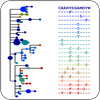
RESEARCH
BIOINFORMATICS

Vaccines induce a diverse repertoire of antibody and cellular responses, which can vary significantly in terms of their contribution to vaccine efficacy. We aim to characterize polyclonal immune responses in a repertoire-wide manner by developing statistical analysis and annotation tools that 1) annotate B cell receptor sequences and determine B cell lineages from immunosequencing data and 2) quantitatively compare repertoire-wide antibody and B cell receptor properties.
Software
Publications
Ripoll, D. R., S. Chaudhury, and A. Wallqvist. Using the antibody-antigen binding interface to train image-based deep neural networks for antibody-epitope classification. PLOS Computational Biology. 2021 March 29; 17(3):e1008864. [PDF, PubMed]
Khavrutskii, I. V., S. Chaudhury, S. M. Stronsky, D. W. Lee, J. G. Benko, A. Wallqvist, S. Bavari, and C. L. Cooper. Quantitative analysis of repertoire-scale immunoglobulin properties in vaccine-induced B-cell responses. Frontiers in Immunology. 2017 August 14; 8:910. [PDF, PubMed]
Chaudhury, S., G. D. Gromowski, D. R. Ripoll, I. V. Khavrutskii, V. Desai, and A. Wallqvist. Dengue virus antibody database: systematically linking serotype-specificity with epitope mapping in dengue virus. PLOS Neglected Tropical Diseases. 2017 February 21; 11(2):e0005395. [PDF, PubMed]
Lee, D. W., I. V. Khavrutskii, A. Wallqvist, S. Bavari, C. L. Cooper, and S. Chaudhury. BRILIA: integrated tool for high-throughput annotation and lineage tree assembly of B-cell repertoires. Frontiers in Immunology. 2017 January 17; 7:681. [PDF, PubMed]